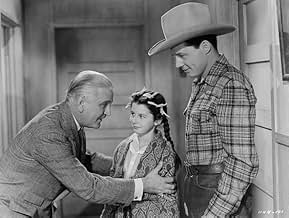Virginia Weidler(1927-1968)
- Actress
- Soundtrack
Delightful child/juvenile actress Virginia Anna Adelaide Weidler (her friends called her "Ginny") had that knowing gleam in her eye that usually spelled trouble in one form or another for anyone nearby. She was born in Eagle Rock, California, in 1927, one of six children. Her mother was former Wagnerian opera singer Margarete Radon (born Margarete Therese Louisa Meyer), and her father was architect Alfred Weidler.
Virginia nearly made her acting debut at age 3 in John Barrymore's Moby Dick (1930) but was summarily replaced. A year later, she scored her first small movie bit in Warner Baxter's Surrender (1931) and was on her way. One of her brothers, child actor and musician George Weidler, was Doris Day's first husband (from 1946 to 1949).
RKO picked up young Virginia after learning that she could speak a bit of French. The average-looking youngster was ably cast as rural tomboy types in Laddie (1935) and Freckles (1935), the latter film allowing her to do a dead-on parody of Shirley Temple. She earned her first lead in Girl of the Ozarks (1936) and showed she could easily hold her own. After an unimpressive stint with Paramount, who tried to groom her as a rival to Fox's bratty Jane Withers, she was finally picked up by MGM and her film career blossomed. Co-starring with Mickey Rooney in Love Is a Headache (1938), she proved a natural young comedienne and precocious scene-stealer in such films as Out West with the Hardys (1938) (again with Rooney) and Too Hot to Handle (1938).
Little Virginia could also shine in dramatic outings, as she did with The Lone Wolf's Daughter (1939) and Bad Little Angel (1939), but she was never a good choice for sappy roles, as demonstrated when she played Norma Shearer's whiny imp of a daughter in The Women (1939). Virginia's forte was providing comedy relief, and she reached her young peak with two classic MGM films: Young Tom Edison (1940), as Rooney's creative sister, and The Philadelphia Story (1940), as Katharine Hepburn's smart-alecky younger sister. Her tongue-in-cheek rendition of "Lydia the Tattooed Lady" at the piano was just one of many memorable highlights from this vintage classic.
The young actress's career started to slip away from her when the teenage Shirley Temple signed with MGM, abruptly bumping "Plain-Jane" Virginia back to secondary status. After rather disappointing receptions to Born to Sing (1942), The Youngest Profession (1943), and Best Foot Forward (1943), the awkward teen left films and turned to vaudeville as a song-and-dance comedy performer, utilizing her full-scale talents as a mimic. She made her legitimate stage debut in "The Rich Full Life" at the John Golden Theatre in 1945, but the show closed within a month.
Soon after, Virginia retired from show business, married, and had two children. She passed away from a heart ailment at 41. After her death it was learned that she had suffered from rheumatic fever as a child.
Virginia nearly made her acting debut at age 3 in John Barrymore's Moby Dick (1930) but was summarily replaced. A year later, she scored her first small movie bit in Warner Baxter's Surrender (1931) and was on her way. One of her brothers, child actor and musician George Weidler, was Doris Day's first husband (from 1946 to 1949).
RKO picked up young Virginia after learning that she could speak a bit of French. The average-looking youngster was ably cast as rural tomboy types in Laddie (1935) and Freckles (1935), the latter film allowing her to do a dead-on parody of Shirley Temple. She earned her first lead in Girl of the Ozarks (1936) and showed she could easily hold her own. After an unimpressive stint with Paramount, who tried to groom her as a rival to Fox's bratty Jane Withers, she was finally picked up by MGM and her film career blossomed. Co-starring with Mickey Rooney in Love Is a Headache (1938), she proved a natural young comedienne and precocious scene-stealer in such films as Out West with the Hardys (1938) (again with Rooney) and Too Hot to Handle (1938).
Little Virginia could also shine in dramatic outings, as she did with The Lone Wolf's Daughter (1939) and Bad Little Angel (1939), but she was never a good choice for sappy roles, as demonstrated when she played Norma Shearer's whiny imp of a daughter in The Women (1939). Virginia's forte was providing comedy relief, and she reached her young peak with two classic MGM films: Young Tom Edison (1940), as Rooney's creative sister, and The Philadelphia Story (1940), as Katharine Hepburn's smart-alecky younger sister. Her tongue-in-cheek rendition of "Lydia the Tattooed Lady" at the piano was just one of many memorable highlights from this vintage classic.
The young actress's career started to slip away from her when the teenage Shirley Temple signed with MGM, abruptly bumping "Plain-Jane" Virginia back to secondary status. After rather disappointing receptions to Born to Sing (1942), The Youngest Profession (1943), and Best Foot Forward (1943), the awkward teen left films and turned to vaudeville as a song-and-dance comedy performer, utilizing her full-scale talents as a mimic. She made her legitimate stage debut in "The Rich Full Life" at the John Golden Theatre in 1945, but the show closed within a month.
Soon after, Virginia retired from show business, married, and had two children. She passed away from a heart ailment at 41. After her death it was learned that she had suffered from rheumatic fever as a child.

































